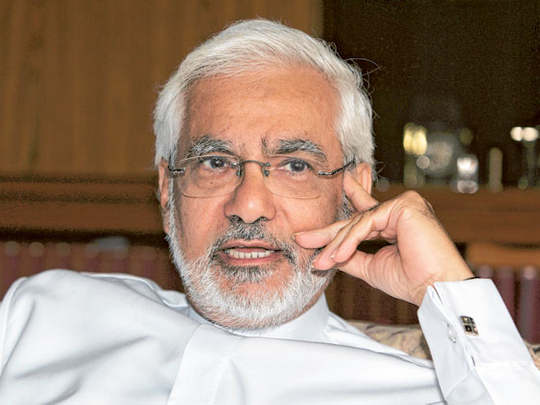
Dubai: Emirati poet Dr Shehab Geanem said winning the Tagore Peace Prize has come as a “big surprise”.
The writer, in his 70s, became the first Arab to win the prize, named after Indian Nobel Laureate Rabindranath Tagore. It is awarded once every two years to a person noted for contributions in building cultural bridges.
Dr Ganem was recognised for his achievements in poetry and its translation that helped cultural exchanges and understanding.
He told Gulf News: “It was a big surprise. I received the news on [Monday] afternoon over the phone and e-mail. I’m happy and grateful that they [the award committee] thought of me. Other people who have received this award have been heads of states and Nobel Laureates.”
He added: “I’m open to other cultures, it doesn’t mean I’m not proud of my own values and religion. But I’m willing to hear others. And this has been reflected in my poetry and other creative work.”
The prolific author, who has published some 50 books and scores of volumes of poetry, will be honoured during an award ceremony on May 6, 2013 in the eastern Indian city of Kolkata.
Dr Ganem, who has an engineering background, has translated poems into Arabic and English, including those originating in India.
He also translated Gulf (Arabic) poetry into English, which was then translated into Slovak by a top Slovak diplomat.
Dr Ganem said: “If I was an ambassador to any country, I would first say to them: ‘Who are your best poets and their best selected poems?’ This is because you can know a people through their poetry. Poetry is the soul of a nation, it’s connected with loftiness in man, which is expressed best in poetry.”
He added that poetry was “art no 1” of the Arabs, surpassing their talent for calligraphy.
“The classical, proper Arabic has given way to the more colloquial Arabic today. It’s more superficial and not so deep.”
He said he is nearly done with a 10-year project to compile English proverbs that have equivalence in Arabic _ and he has discovered over 1,000 examples.
“This dictionary is a big project, it should be out in a few weeks. The equivalence in Arabic is drawn not just from proverbs but from poetry, the Holy Quran and other sources too.
“Humans think in the same way. A proverb shaped by rural life might come to Dubai or London. It’s a very interesting subject,” Dr Ganem said.
“There’s humour, philosophy, simple matter-of-fact ideas and sophisticated thoughts in it. There are also opposites.”
He explained that, for instance, the saying “too many cooks spoil the broth” flies in the face of “more hands make light work”.
“And how do you reconcile the proverb about a ship-with-two-captains-sinks with ‘two heads are better than one?’ You can argue both ways, can’t you? I guess it depends on the situation, and on who’s saying it.”
His other main current endeavour is a book about the verses of Al Fatiha, the first chapter of the Quran.
“The Holy Quran is such a vast subject, you can write a chapter on each verse. I’ll be reviewing the literature on this and discussing the meanings in depth,” he said.
Dr Ganem conceded that in today’s digital media dominated world, poetry is losing lustre with the youth.
“We have to admit we can’t make the new generation like what we liked so strongly. The social media, internet and cinema — these are fantastic tools of learning too. But I don’t want the youth to stop reading books, going only for fast pleasures and consumerism.
“You have to give time to a book — to absorb it, to meditate and ponder its meaning. It’s not about ‘take, take, take.’”
Dr Ganem retired as managing director of Mohammad Bin Rashid Technology Park in 2003 and provided consultancy services “very selectively for a while”.
“Now I’m focusing just on my books.”












